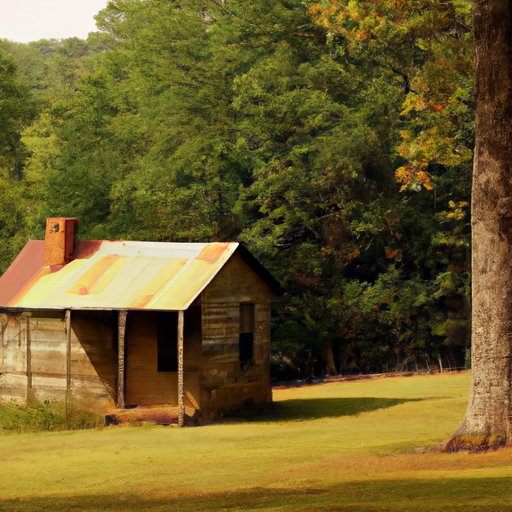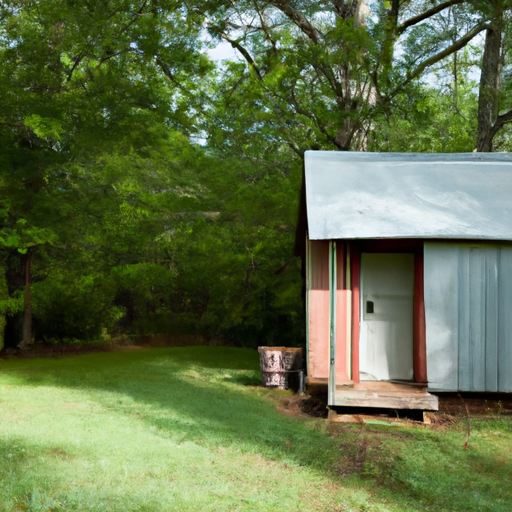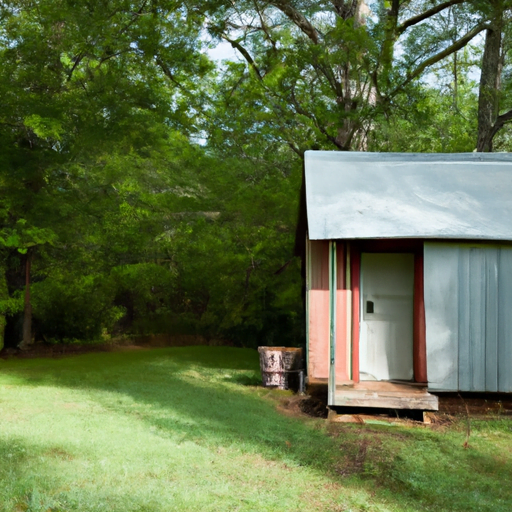So, have you ever wondered if it’s legal to live off the grid in Alabama? You know, disconnecting from the traditional power and water systems and relying on your own resources? Well, it’s a fascinating topic, and I’m here to give you some insight.
Living off the grid can be an adventurous and self-sustainable lifestyle choice. It generally involves generating your own electricity, sourcing water from natural resources, and even growing your own food. While many people are drawn to this alternative way of living, the legal aspects can sometimes be a concern.
In Alabama, the laws regarding living off the grid are a bit complex. While it is not explicitly illegal to live off the grid, there are regulations and codes that you need to be aware of. These regulations mainly focus on building codes, waste management, and zoning laws. But don’t worry, in our upcoming article, we’ll dive into those details and help you understand what you need to know if you’re considering an off-grid lifestyle in Alabama. Stay tuned for more!

Overview
Living off grid refers to a lifestyle where individuals or communities choose to disconnect from public utilities and rely on self-sustaining resources for their needs. This alternative way of living has gained popularity in recent years due to its potential for energy independence and reduced environmental footprint. However, it is important to understand the laws and regulations surrounding off grid living in Alabama in order to ensure compliance and avoid legal issues. This article aims to provide an overview of living off grid in Alabama, including the legal framework, zoning and building codes, rules for water and waste management, environmental impact, off-grid communities in Alabama, advantages of living off grid, and challenges and considerations.
What is living off grid?
Living off grid essentially means living without being connected to public utilities such as electricity, water, and sewage systems. This lifestyle often involves generating one’s own power through renewable sources such as solar panels or wind turbines, collecting and storing rainwater for consumption, and utilizing composting toilets or septic systems for waste management. The motivation behind living off grid is often driven by a desire for self-sufficiency, sustainability, and independence from traditional utility providers.
Laws and regulations in Alabama
Understanding the legal framework is essential for those considering living off grid in Alabama. While the state does not have specific laws targeting off grid living, there are regulations in place that individuals must comply with. These regulations mainly pertain to zoning and building codes, as well as rules for water and waste management.

Zoning and building codes
Zoning and building codes determine how land and structures can be used in different areas. In Alabama, these codes are typically enforced locally by county governments. Before embarking on an off grid lifestyle, it is important to research and understand the zoning regulations in the specific county where you plan to live. Some areas may have strict restrictions on residential structures, while others may have more lenient regulations.
Obtaining permits and undergoing inspections is generally required when constructing buildings, even for off grid homes. It is crucial to adhere to the local building codes to ensure the safety and structural integrity of your off grid dwelling. Additionally, some areas may have restrictions on the size and materials used for off grid structures, so it is important to be aware of these limitations.
Rules for water and waste management
Water and waste management are important factors to consider when living off grid in Alabama. The state has regulations in place to ensure the safe handling and disposal of waste in order to protect public health and the environment.
Regarding wastewater disposal, Alabama requires proper septic systems or composting toilets for off grid dwellings. It is important to comply with the state’s regulations on wastewater management to prevent contamination of groundwater and surrounding ecosystems.
In terms of water supply, collecting and storing rainwater is a common practice for off grid living. However, there are rules and regulations regarding the collection and usage of rainwater in Alabama. It is important to familiarize yourself with these regulations to ensure compliance and avoid any legal issues.
Environmental impact
Living off grid can have both positive and negative impacts on the environment. On one hand, off grid living often encourages conservation and sustainability practices, such as utilizing renewable energy sources and minimizing water consumption. This can contribute to the reduction of greenhouse gas emissions and overall environmental footprint.
However, it is also important to consider the potential impact of off grid living on natural resources and ecosystems. For example, improper waste disposal or over-extraction of water can have negative consequences on local ecosystems and biodiversity. It is crucial for off grid individuals and communities to be mindful of their environmental impact and take steps to minimize negative effects.
Off-grid communities in Alabama
Alabama is home to several off-grid communities where like-minded individuals come together to live a self-sustaining lifestyle. These communities often share resources and responsibilities, fostering a sense of community and cooperation. Some examples of off-grid communities in Alabama include Earth Knack Homestead in Shelby County and Little Hippie Homestead in Talladega County.
Living in an off-grid community has its benefits and challenges. On one hand, communal living can provide a support network, shared knowledge, and opportunities for collective decision-making. On the other hand, communal living may require compromises and adjustments to accommodate different lifestyles and preferences.
Advantages of living off grid
Living off grid offers several advantages that may appeal to individuals seeking self-sufficiency and independence. One of the primary benefits is energy independence. By generating their own power, off-grid individuals are not reliant on public utilities and are shielded from utility rate fluctuations.
Additionally, living off grid often reduces environmental footprint. By utilizing renewable energy sources and practicing conservation measures, off-grid individuals can minimize their impact on the environment and contribute to a more sustainable future.
Moreover, living off grid fosters self-reliance and personal freedom. It allows individuals to rely on their own skills and resources, offering a sense of empowerment and self-sufficiency. This lifestyle can also provide an opportunity to disconnect from the hustle and bustle of city life and reconnect with nature.
Challenges and considerations
While the off grid lifestyle has its advantages, there are also challenges and considerations that need to be taken into account. One major consideration is the initial setup costs. Establishing an off grid system can require a significant investment, including purchasing solar panels, batteries, rainwater collection systems, and other necessary equipment. It is important to carefully evaluate the financial implications before transitioning to an off grid lifestyle.
Another challenge of living off grid in Alabama is limited access to utilities and services. Being disconnected from public utilities means that off-grid individuals may have to find alternative solutions for internet access, healthcare services, and other amenities. It is important to plan and prepare for these challenges to ensure a smooth transition to the off grid lifestyle.
Lastly, there may be social and cultural adjustments when living off grid. The off grid lifestyle often differs from the norms and conveniences of urban living, which can require adaptation and flexibility. It is important to be prepared for potential social isolation or limited access to social activities and amenities.
Conclusion
Living off grid in Alabama is not explicitly illegal, but it is important to understand and comply with the laws and regulations in place. Familiarizing yourself with zoning and building codes, as well as rules for water and waste management, is essential to ensure a legal and sustainable off grid lifestyle. While there are challenges and considerations, the benefits of living off grid, such as energy independence, reduced environmental footprint, and personal freedom, can outweigh the challenges for those seeking a self-sufficient lifestyle. By weighing the legal aspects and understanding the benefits and challenges, individuals can make informed decisions about living off grid in Alabama.




